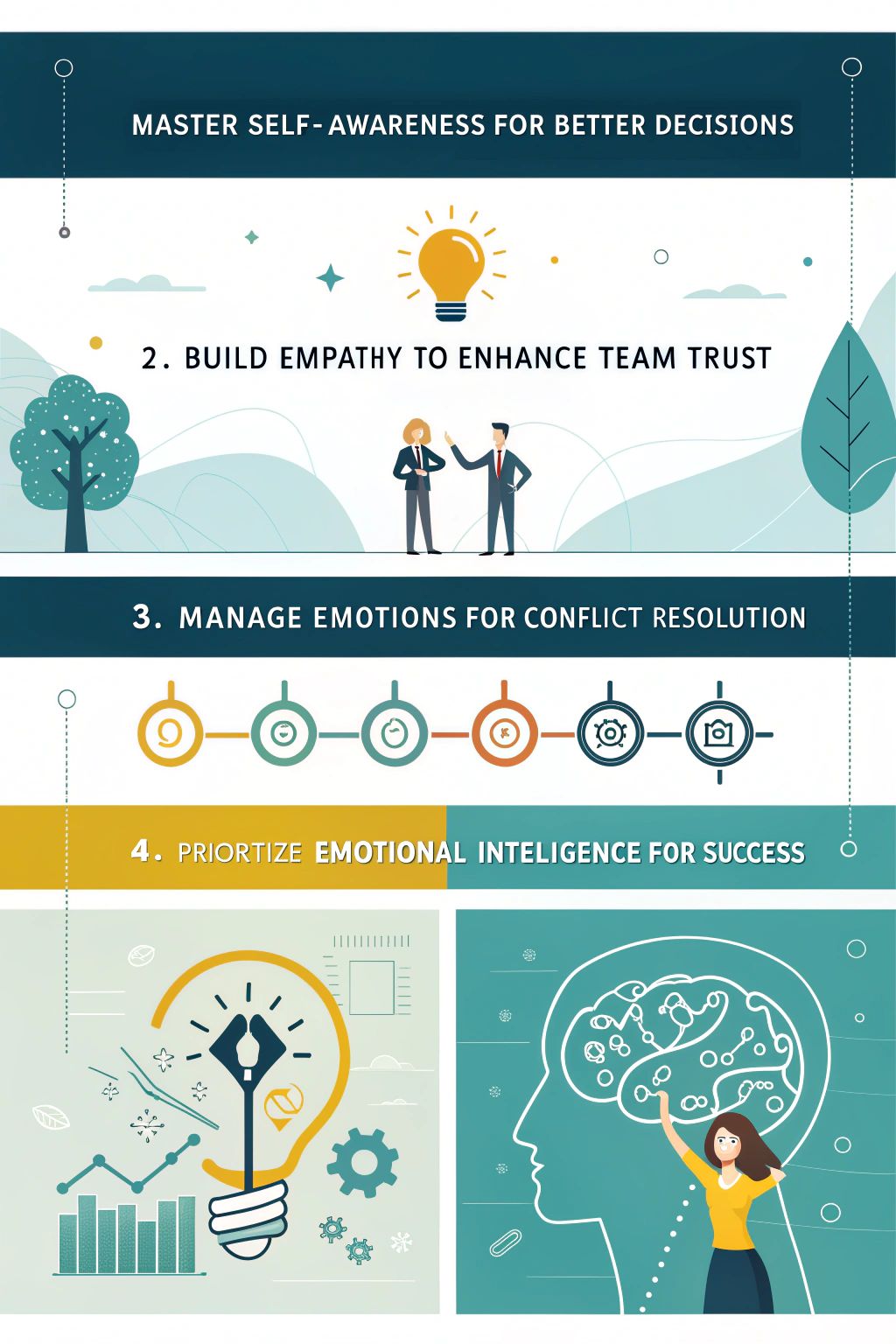Numerous managers have difficulties building a good rapport with their groups, which can result in decreased morale and productivity. The solution may actually be hiding in a quality that isn’t typically listed on a CV: the emotional intelligence of a manager.
As per recent research, this particular trait is prioritised by 71% of employers over technical prowess when they are choosing leaders.
Emotional intelligence involves understanding and controlling emotions, be it yours or those of individuals around you. In this blog, we will take a closer look at pivotal aspects such as self-awareness, empathy, and proficient communication capabilities.
Such skills hold immense value for successful leadership. Additionally, we will provide useful advice on how you can improve your emotional intelligence in order to be a more effective leader.
Eager to gain new knowledge? Continue reading.

Defining Emotional Intelligence for Managers

Emotional intelligence (EI) for managers entails knowing, interpreting, and controlling their own feelings and those of others. The idea was first brought to light by John Mayer and Peter Salovey in 1990.
Emotional intelligence contributes significantly to effective leadership and serves to enhance relationships within teams. This thought was further developed by psychologist Daniel Goleman in his 1995 publication, where he presented the idea that EI could have a greater significance than an IQ score for leaders.
Studies provide backup for the value of EI at work. TalentSmart found it’s the highest forecast of job performance. Also, 71% of employers think emotional intelligence holds greater weight than technical skills in selecting leaders.
This means that becoming an emotionally intelligent manager could result in achieving success more rapidly rather than simply having complete comprehension of your job.
Core Components of Emotional Intelligence
Emotional intelligence in managers comprises four core components central to effective leadership. Managers with high emotional intelligence demonstrate skills in self-awareness, self-management, social awareness, and relationship management.
Self-Awareness
Self-awareness is a key factor in emotional intelligence for leaders and is about acknowledging your own strengths, weaknesses, and the influence your emotions have on those around you.
Tasha Eurich’s study indicates that only a small number, 10–15%, of individuals truly have self-awareness. This figure emphasises its infrequency yet important role in leadership effectiveness.
Leaders aiming to improve their emotional intelligence initiate this by taking part in self-analysis practices such as 360-degree feedback. This system collects viewpoints about a manager’s conduct from workmates at all levels—in higher positions, equal to them, and lower positions in the organisational chain.
Recognising how others view your actions enables leaders to adjust and enhance their professional relationships noticeably. By this means, managers expose their personal hidden areas and learn to manage themselves more efficiently—a primary part in becoming emotionally intelligent leaders.
Self-Management
Self-management marks a manager’s ability to handle their emotions in stressful situations and respond with thought. This skill lets managers stay calm under pressure, making it easier for them to solve problems effectively.
They use strategies like taking short breaks and practising emotional regulation exercises. These methods help in controlling impulses and avoiding hasty decisions.
Managers with high emotional intelligence can keep their cool even when the stakes are high. They know how to manage their reactions to maintain a productive work environment. This capability not only aids in resolving organisational conflicts but also plays a pivotal role in leadership success.
Employees look up to leaders who can guide them through challenges without buckling under stress, fostering trust within the team.
Social Awareness
Social awareness serves as the central pillar for efficacious leadership, acknowledging others’ sentiments and the dynamics within a business. This factor is important for administrators aiming to improve their leadership capabilities.
An administrator with elevated social awareness can perceive the emotional state of their colleagues, acknowledging and appreciating their emotions and viewpoints. It’s more than just being conscious; it also includes introducing actionable methods to bolster team interaction.
Empathy stands as a key ingredient in fortifying this awareness. It is regarded as a principal leadership skill by DDI, mirroring its significance in cultivating cooperation. Based on research by EY Consulting in 2023, 87% of participants noticed that empathy in leadership led to positive shifts within the workplace atmosphere.
The data also reveals that empathetic leaders are 40% more successful in areas such as mentoring and decision-making. These leaders not only identify emotions but also control them to foster trust and promote constructive dialogue, thereby proving indispensable for conflict management and motivational strategies.
Relationship Management
Relationship management orbits around the techniques managers utilise to interact with others at their workplace. This encompasses guidance, training, and conflict resolution. A significant aspect of this is preserving a sense of respect for everyone.
A notable research by the Society for Human Resource Management has revealed that 72% of workers value being treated with respect at their place of work. Unresolved disagreements could lead to an excessive amount of squandered time – as much as eight hours due to gossip.
The responsibility of managers in establishing the organisational culture is pivotal. They implement skills like active listening and empathetic leadership to comprehend the sentiments and viewpoints of their team.
Such competencies equip them to control disputes before they expand into more complex problems. Such abilities are not merely an asset; they are a required component for efficient leadership.
Practical Techniques for Enhancing Emotional Intelligence
Managers can boost emotional intelligence by cultivating empathy and understanding others, while enhancing self-regulation and impulse control. These methods promote improved comprehension and handling of emotions in the workplace.
Developing Empathy and Understanding Others
Developing empathy involves listening closely to what others say and showing you understand them. A powerful tool for this is active listening, which means paying full attention and then repeating back what you heard in your own words.
This method helps build trust and shows real interest in the feelings and experiences of others. For leaders aiming to enhance their emotional intelligence, practising this can lead to significant improvements in workplace relationships.
A recent EY Consulting study found that 87% of people see a strong link between empathetic leadership and positive changes at work. Leaders should ask open-ended questions like “How are you?” or “What do you need more from me?” These questions create a safe space for honest communication, laying the groundwork for effective collaboration.
Emphasising these behaviours not only demonstrates a leader’s ability to understand but also their commitment to acting on feedback for continuous improvement.
Improving Self-Regulation and Impulse Control
Leaders can improve their emotional intelligence by mastering self-regulation and impulse control. This ability plays a significant part in leadership achievement as it averts impulsive reactions that might negatively impact relationships or decision-making procedures.
A potent method is the identification of emotional triggers, assisting leaders in acknowledging the instances in which they are prone to act impulsively. Reflecting on these triggers through journal writing provides understanding of the way emotions sway behaviour.
Another efficient method involves the implementation of 360-degree feedback evaluations. These appraisals reveal hidden areas in a leader’s self-awareness, exposing aspects where emotional reactions might not meet the desired leadership actions.
Establishing precise development aims and monitoring progress towards these goals promises perpetual enhancement in managing one’s emotions under pressure. This method encourages personal development and also improves the collective wellbeing of organisational culture by fostering psychological security and resilience among team members.
Conclusion
To sum up, mastering emotional intelligence is essential for effective leadership. Cultivating empathy and self-regulation are vital techniques for enhancing emotional intelligence in managers.
The capacity to recognise and manage emotions, coupled with resolving conflicts effectively, is fundamental for leaders. Emotional intelligence has a significant impact on organisational performance through empathetic leadership and improved problem-solving skills.
Ultimately, giving priority to emotional intelligence among managers will result in more engaged teams and enhanced overall performance within the organisation.
MindOwl Founder – My own struggles in life have led me to this path of understanding the human condition. I graduated with a bachelor’s degree in philosophy before completing a master’s degree in psychology at Regent’s University London. I then completed a postgraduate diploma in philosophical counselling before being trained in ACT (Acceptance and commitment therapy).
I’ve spent the last eight years studying the encounter of meditative practices with modern psychology.

